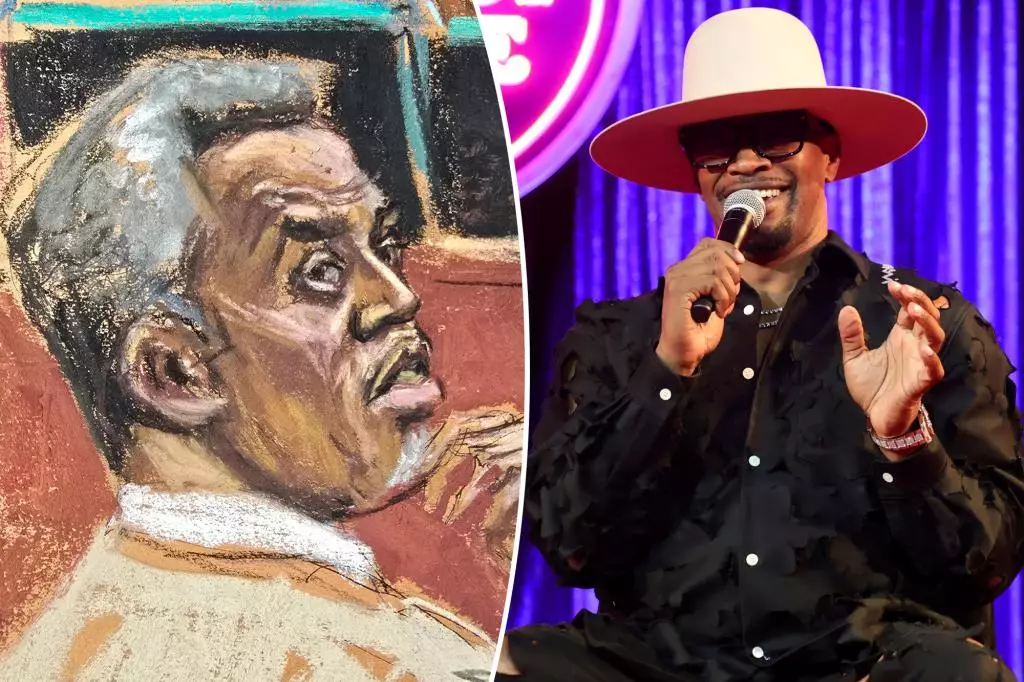In the heart of West Hollywood, during a memorable stand-up performance at The Comedy Store, Jamie Foxx took aim at Sean “Diddy” Combs, unleashing a stream of biting commentary that left audiences both shocked and entertained. The comedian, known for his sharp wit and bold opinions, didn’t hold back when referencing the sordid details surrounding Diddy’s ongoing sex-trafficking trial. It’s a testimony to both the gravity of Combs’ situation and Foxx’s talent for mixing humor with poignant social critique. In an era where public figures are increasingly scrutinized, this roast not only entertained but also served as a commentary on larger cultural narratives.
Confronting the Color of Celebrity
As Foxx jabbed at Diddy’s alleged misdeeds, he illuminated a troubling dichotomy within the African American community’s perception of public figures. By describing Diddy as a “nasty motherf—ker,” Foxx emphasized a deep sense of betrayal, particularly when a figure once idolized becomes embroiled in scandal. This reaction is not merely personal; it resonates with collective mourning for the loss of revered icons in the Black community. When Foxx remarked, “Especially for our community – white people, it’s cool, but Black people, like, that was our hero,” he highlighted a critical cultural intersection where celebrity often intersects with identity, trust, and values. The dismissal of these high-profile transgressions as mere tabloid fodder for white audiences contrasts sharply with how they are dissected and debated within Black circles.
Graphic Revelations and Humor’s Role
Foxx’s mention of the graphic testimonies from Diddy’s ex-girlfriend, Casandra “Cassie” Ventura, further exemplifies the shock factor that comedy can wield in exposing uncomfortable truths. By invoking such vulgar allegations as making a male escort “urinate in her mouth,” Foxx crossed a boundary ordinarily reserved for the most serious of discussions. However, his humor quickly transformed the disturbing content into a conversation starter about the implications of power dynamics, consent, and morality in celebrity culture. His phrase, “What are we taking? ‘Cause I don’t want any of that,” is a clever play on Diddy’s infamous catchphrase, punctuating how inaccurate our perceptions can become when juxtaposed against personal failings.
Revisiting Iconography in Hip-Hop
It is impossible to overlook the reverberations of Foxx’s comments on the image of hip-hop itself. Once a genre celebrated for its rebellious spirit and capacity to uplift, the unraveling of figures like Diddy reveals a narrative of exploitation lurking beneath the surface. As hip-hop continues to evolve, the legacy of artists now embroiled in legal chaos raises questions about the inherent messaging and symbolism that they projected. The transformation of Diddy’s identity from “It’s all about the Benjamins” to “It’s all about the baby oil” starkly illustrates this shift, forcing listeners to reassess lyrics filled with bravado and materialism against a backdrop of personal scandal.
The Broader Impact of Celebrity Misconduct
The gravity of misconduct by public figures like Diddy cannot simply be brushed aside; it speaks to a systemic issue extending beyond the celebrity bubble. Jamie Foxx’s roasting serves as an indictment of a culture that too often normalizes deviant behavior among its stars, ultimately affecting the fabric of the very communities that idolize them. Foxx’s comedic approach sheds light on the dissonance felt by fans who grapple with the duality of admiration and disgust in the face of such scandals. This is especially poignant for viewers aware of Diddy’s substantial influence on the culture and economy of hip-hop.
In an age where social media amplifies every comment and accusation, Foxx’s performance at The Comedy Store has become more than just a roast; it’s a resonant call that challenges the complacency surrounding celebrity ethics. Whether laughing or cringing at his revelations, audiences are encouraged to confront uncomfortable truths about the icons who shape our cultural landscape. As discussions like these permeate through comedy clubs and beyond, they spark essential conversations about accountability, ethics, and the power dynamics present in fame.
